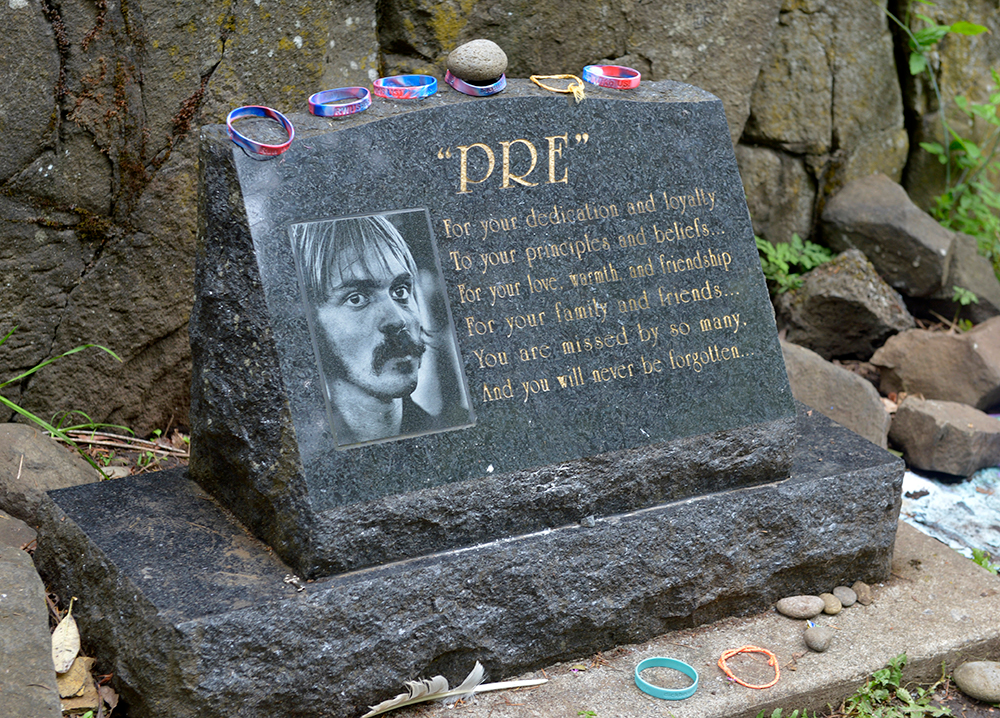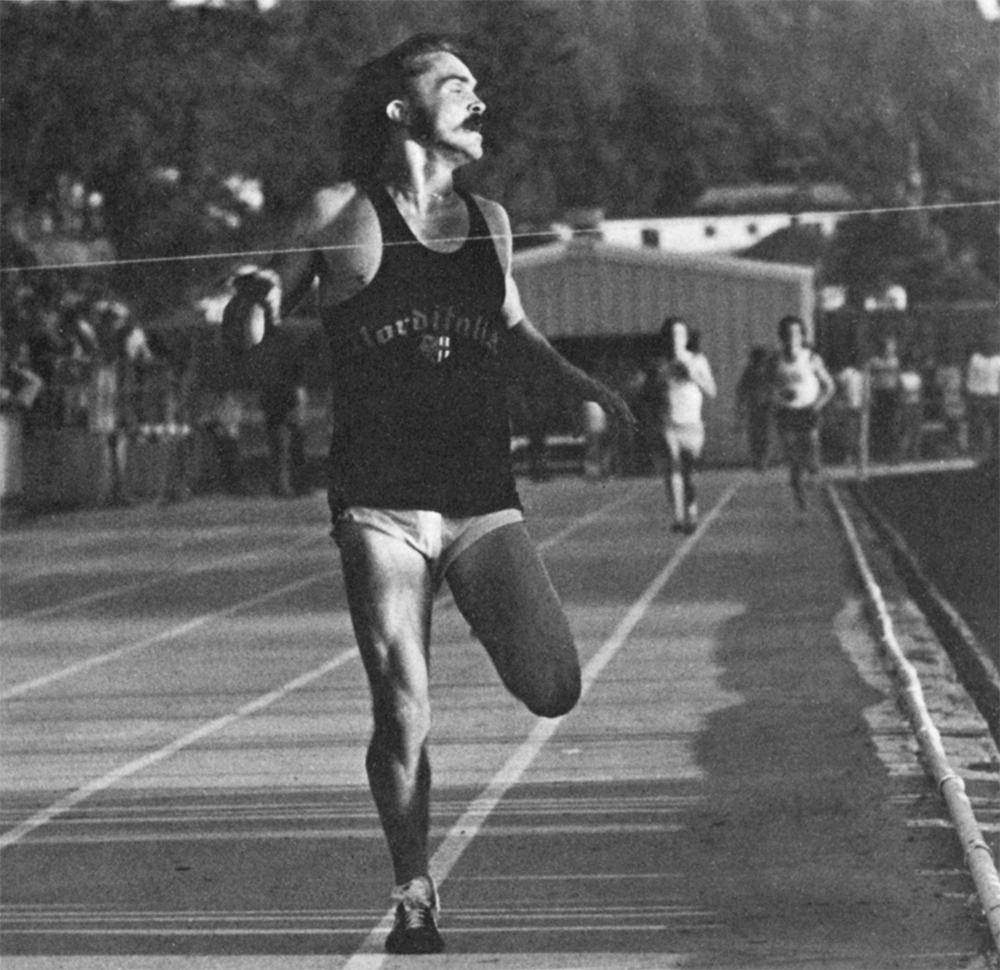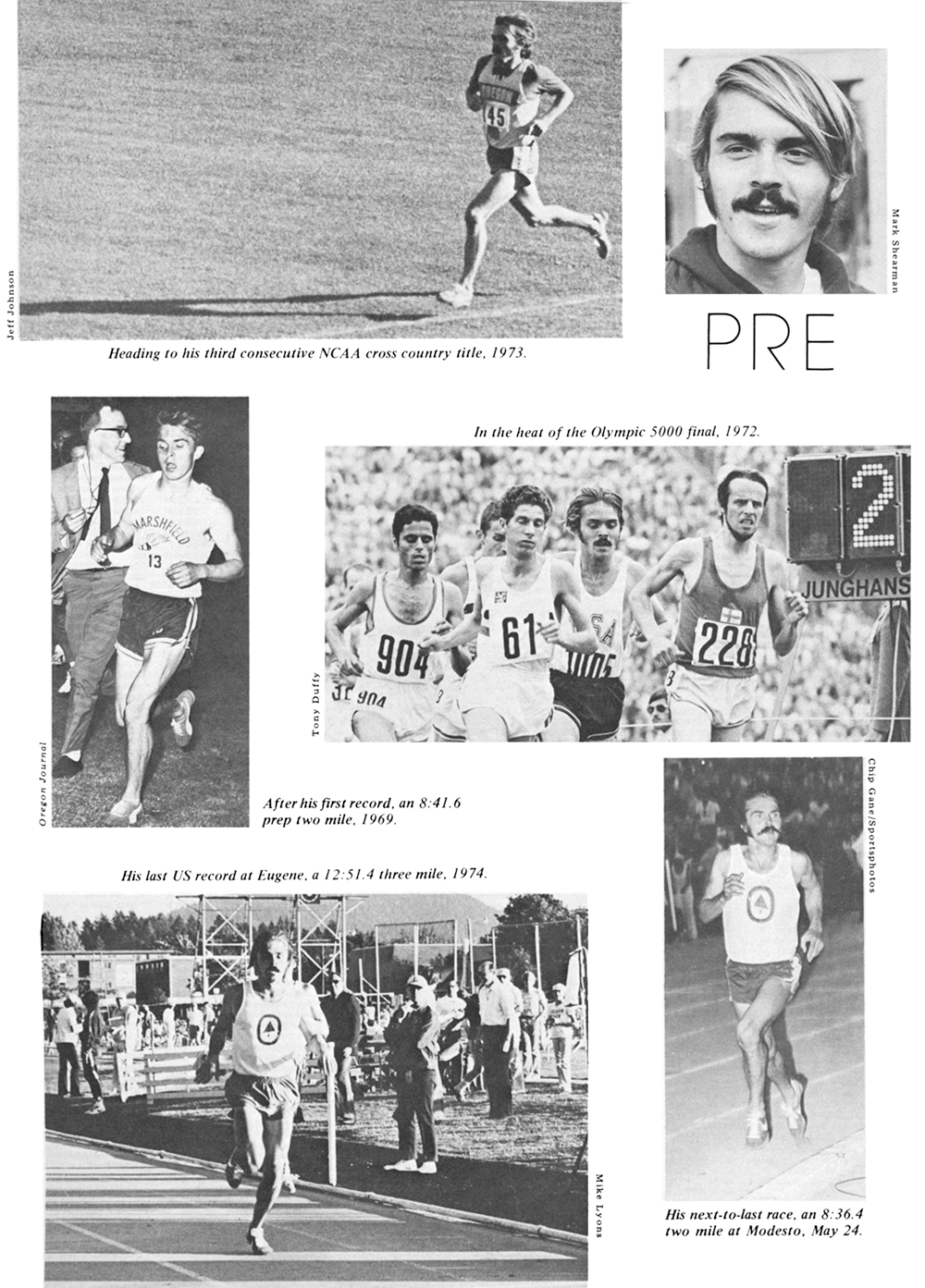
HERE, IN THE ultimate chapter of a 19-part series that began some 4 months ago, is how we reported the final moments of Steve Prefontaine’s career, and public reaction to his premature passing. We have taken the liberty of doing some stylistic updatings to mirror our modern protocol and also added an editorial comment or three to what totals out at about 38,000 words.

July 1975: A Race—And A Racer—To Remember
Eugene, Oregon, May 29—12:58.8/13:23.8. Not his fastest race; not his most important; not even a typical race. But those times, and this Oregon Twilight race, will always be remembered as Steve Prefontaine’s last. Early the next morning, Oregon’s idol and America’s premier track athlete died in a one-car crash not far from the University of Oregon.
Today, as usual, the race Pre would run would be the last scheduled, the feature. He followed super-rabbits Paul Geis and Terry Williams for the first two laps and then let Frank Shorter take the lead as the Duck duo dropped out. Frank led at the mile in 4:18 and the 2M in 8:40.5, as Pre led only laps 5 and 6.
Suddenly, with only three laps to go, things looked more familiar to Pre fans, as he burst a 63.0 to get them on their feet and leave Shorter 20y back. His last lap was a creditable 60.3 as he missed his own American 5000 Record by 1.6 seconds. Shorter finished with a PR 13:32.2.
As usual, Pre took a victory lap, which Eugene fans many years before had grown to love, almost like trying to relive the race. Then he blew a kiss to the crowd, thanking them, and gesturing that they were No. 1. Pre had never lost in Eugene at any distance longer than a mile (20 straight), and to these fans he never would lose in Eugene, but four hours later he did.
Eugene and Oregon would never be able to repay all the moments that Pre had given them. /John Gillespie/
August 1975: Of People & Things
[Editor Bert Nelson’s column]
More than anything else, what I admired about Pre was his guts. In an activity where physical courage is commonplace if not downright essential, Steve Prefontaine had far more than his share.
I first saw Pre run in ’69. Lack of experience and the tenderness of his 18 years meant nothing to Steve. When America faced an All-European team he hung on until almost the last lap, finishing a pooped 3rd.
Just a week later he met the West Germans. As T&FN reported, he “gave it all he had but was too tired after his supreme effort in Stuttgart,” finishing 2nd. Earlier, he had opposed the Russians.
In each race he gave it all he had. It was then, six summers ago, that I realized Pre was something special. I didn’t know it at the time but I had enrolled myself in the growing legion of admirers that was to become known as “Pre’s People.”
It was in the Pac-8 cross country race that November that he and Gerry Lindgren put on as good a battle as I can remember.
Unawed by the opposition—that was one of Steve’s dominant traits—he dashed out with the gun. Leaving the rest of the field far behind. Pre and equally gritty Lindgren took turns putting the heat on the other. At the end of the punishing 6-miler Lindgren just did get his skinny chest in front.
That was the pattern that Pre followed to the end. Run tough. And, as he matured, the wins came with increasing frequency. In ’70 he won the first of four straight NCAA titles, a yet-to-be-matched achievement. A week later he challenged on the final backstretch of the AAU before losing, with an injured foot which prompted a doctor to say, “I don’t see how he could run on it.”
With the victories came the records. Ultimately there were his 7 still-standing national outdoor marks. They too were a measure of the Prefontaine guts.
Punishing one’s self in tough competition is hard enough. But it’s ever so much harder to do it by yourself. And a number of Steve’s records came when his two toughest rivals were himself and the ever-ticking stopwatches.
For me, the highlight and epitome of Pre’s career was at Munich. Steve lost. But he never had a finer hour.
Facing a charged-up Lasse Viren, Pre must have known his chances were slim. But once again, perhaps as never before, he gave it all he had. When no others would, Pre forced Viren to run a 4:01.2 final mile to win.
If ever there was a gallant loser, Pre was it. He was “only” 4th. But none of the others left as much of himself on the track. Tied up, starting to stagger, completely exhausted, Steve was true to himself and to his people.
Even harder than pushing it all alone in a race is punishing yourself in training. Yet Pre was known to work so hard in workouts that his teammates would applaud.
Steve also had the strength of character to speak up for what he believed. When veteran Harald Norpoth sat on 19-year-old Prefontaine for 4750m, Steve told the press, “I don’t have much respect for a runner who’d let a kid do all the work and then sprint away at the end.”
When he got tired to being used by the AAU he said, as every other athlete would have to admit, that he was running for himself, not for his country. When that statement, taken out of context, shocked many, he had the further courage to stick by his words while explaining that love of country, to which he freely admitted, is not involved in the career of an amateur athlete.
It took another kind of courage to give up plans to open a bar when it was suggested it wouldn’t look good to the youngsters who idolized him. And to say “no” to professional offers, giving up good money for another crack at an Olympic victory some felt could never be his.
There is much to remember of this too short career. Still the records will be broken and the charisma will fade. It will become hard to differentiate between one race and another. But what I won’t forget is the mental and physical courage—the guts—of Steve Prefontaine.
August 1975: Pre’s People Remember
Flags at half-mast, the scoreboard clock ticking away, and silence, Absolute silence. Eugene was saying goodbye to Steve Prefontaine. At the end of the ceremony, the crowd stood, applauding the time on the clock—12:36.2—a time he once said he would be satisfied with in the 3M.
The final memorial service was over, but the tributes from athletes, coaches, newsmen and fans, all Pre’s People, continued…

The Readers
… THE DAY the music died.
Al Cowan—Birmingham, Alabama
STEVE PREFONTAINE’S DEATH hit me like a blindside tackle. I am a runner myself, and like thousands of other runners young and old, I looked up to Pre as an inspiration, a guiding image of success through hard work and a fiery competitive spirit. The man is gone, but the image is stronger than ever. I never met Pre in person, and yet I feel like I’ve lost a friend, for he gave so much to the sport and, indirectly, to me—in such a short time.
Gordon Bess—Northfield, Illinois
FORGET THE TIMES. Forget the records. But can anyone ever forget that glowing face and flashy smile? Steve Prefontaine was a good friend and a fine human being. He brought color into everything he did, including running. He was the kind of person some people call “a free spirit” and nothing could hold him down. Pre said many times that he felt and sensed his fans’ energy and power. Let us all join together for one last hearty “Go Pre!” I’m sure he’ll hear us.
Bob Hensley—Eugene, Oregon
WELL, ARE ALL YOU big-mouth SOBs who have been on Pre’s ass the last few years satisfied now that he’s gone? There isn’t even one American distance runner who could even tie his shoelaces, but all he ever got was garbage. What difference does it make as far as his views were concerned. At least he had guts enough to express them. And there isn’t anything wrong with his American Records, all but three of them set outside Eugene. I don’t know about the rest of you, but I’ll sure as hell miss him. Go Pre!
Danny Weitz—Arroyo Grande, California
A LOT OF PEOPLE knew of Pre the runner but not many knew Pre the man, and how he fought to provide the American athlete with better conditions in which to compete and how he strove to enhance our relationship with the athletes of other countries. He did many great things in and for our state and for our sport. He was loved by many, and those who didn’t love him respected him. Now that he is gone, there is an emptiness inside us and our hearts are sad. We’ll miss that thrilling madness that he inspired in his fans.
Rick Carlson—Portland, Oregon
OVER THE YEARS, when he competed or just visited the Los Angeles area, Pre was my houseguest. He added a great measure of fun, enjoyment and pleasure to our lives and to everyone with whom he came in contact. Pre will be missed. Not only because of his outstanding athletic abilities of which the record book is already filled, but even more so because Pre represented a freshness and decency that is sorely needed at this time. The world of sports has lost a truly great competitor. I have lost my Oregon son.
Henry N. Erlich—Los Angeles, California
WE ARE ALL SADDENED by the loss of Pre. Two years ago, my daughter, then age 13, wrote him and asked for a “Go Pre” t-shirt. Not only did he send the shirt, he wrote her a note describing his days at school and what he hoped to do when he finished. He truly touched our family here in Jersey and is truly missed.
Jim Lat—Atlantic City, New Jersey
IT WAS A SHOCK for me to hear the news of Steve Prefontaine’s tragic death yesterday on French radio. I would like to tell the American public, on behalf of the French public which admired Pre’s guts and determination, how deeply sad we feel here after this tragedy. Our condolences to Pre’s friends and relatives.
J.P. Eudier—Paris, France
THE NEWS about Steve’s tragic accident was quite a blow for the track people of the North. Sure we sometimes thought Pre talked a little too much, but then he was so much alive, so competitive and such a spirit of the track arenas.
Hakan Nordqvist—Täby, Sweden
THE FIRST AND ONLY TIME I saw Pre run at Eugene was at the ’71 AAU meet. He came out onto the field to warmup and the crowd rose to give him a standing ovation. I couldn’t believe it. During the race, as he passed each grandstand, the crowd went crazy, the din was tremendous. Waves of noise washed across Hayward field until I found myself, a non-Pre fan, standing and cheering him on, more excited about track and the beauty of sport than I had ever been. With Pre’s death, for me, some of that excitement is gone forever.
Bill Ward—Sacramento, California
THOSE WHO WOULD MOURN the passing of a young athlete in his prime might consider this quotation from another relatively short-lived rebel of sorts, writer Jack London: “I would rather be ashes than dust! I would rather that spark should burn out in a brilliant blaze than it should be stilled by dry rot. I would rather be a superb meteor, every atom of me in magnificent glow, than a sleepy and permanent planet. The proper function of man is to live, not to exist. I shall not waste my days trying to prolong them. I shall use my time.”
Bob Lord—Pasadena, California
The Press
IRREVERENT AND IMPATIENT, with a personality so compelling, you had to either love him or hate him. It was impossible to ignore Steve Prefontaine. Sports Editor Blaine Newnham of the Eugene Register-Guard tells of his first meeting with Pre at the 1971 US-USSR meet in Berkeley:
“I introduced myself. ‘I’m not talking to reporters anymore,’ he said. ‘I’ve decided that I’d better keep my mouth shut around newspaper people.’ I mentioned his race against the Russians. I asked about his strategy, and about pace. His eyes twinkled. He leaned back against the edge of the balcony and talked about Harald Norpoth and Michel Jazy. ‘I thought you weren’t going to talk to sportswriters anymore?’ I asked. ‘You haven’t asked me any stupid questions yet,’ he said.”
PART OF HIM TOO was his wit. LA Times writer John Hall remembers when he picked Pre to beat Bayi and Walker in the Times Indoor meet and wrote it up in his column. Pre ran one of his worst races ever and finished last. A few days later a letter from Pre arrived in the mail. “How nice, I figured. He’s writing to say thanks for the column or maybe to explain what happened in the race. So I tore it open to get the good words. Out tumbled a clipping of my fumbling forecast with this note attached: ‘Hi John: Next time, leave the predictions to experts, you ignorant ass. Steve Prefontaine.’”
The Athletes
Marty Liquori: “I sort of expected someone to come up to me and tell me that it was a mistake. You know, Pre always got into some kind of trouble and he always got out of it.”
In the Eugene memorial service, friend and rival Frank Shorter talked of his relationship with Pre: “He was somebody I held in awe, not for the times he ran, but for the way he ran, all out. In fact, Steve did not really associate with me in a close personal manner until last year, after I shared the lead with him at the Bowerman Classic 3M. Then, it was if I had passed some sort of test and, I guess in Steve’s eyes I had, because he had high expectations for others as well as himself… he thought it only right that I should help with the pace. I did and that was that: I was his friend.”
Britain’s Dave Bedford remembers Pre’s reaction after the Olympic 5000, a disappointment for both athletes: “He came up to me and said ‘Forget the results, we both lost; now let’s go have us a few beers. That’s what it’s about after all.’ We did. God bless you, Steve.”
Jere Van Dyk remembers when he was at Oregon and he and Arne Kvalheim went over to Coos Bay to recruit Steve. Pre took them on a run and, naturally, set the pace. “Finally, he looked back and said, ‘Am I going too fast for you? I’ll slow the pace down. Can you keep up with me?’”
“He caught the imagination of the track world,” writes Rick Riley, “and made sure there was not a dull or unexciting moment when he was around. Perhaps what is left for us is to sort out the memories we like best of Steve and hold on to those.”
“He was my best friend in racing,” said Belgium’s Emiel Puttemans. “Pre had bad luck at Munich. He didn’t get a medal, but I think he would have been Olympic champion in the 10,000 in 1976.”
Britain’s Ian Stewart, who just nipped Pre out of the 5000 bronze at Munich, said, “This is a terrible blow. We had such a great time together after the Munich Olympics and we were looking forward to getting together again. I’m absolutely shattered.”
In that final memorial service at Hayward Field, Kenny Moore closed the ceremony with a similar sentiment. “He most visibly embodied that streak of defiance that must be in all runners. It is up to us now to hold him in mind clearly, to remember him as he touched us and infuriated us and challenged us. Let us all, in our own ways, silently commend Pre to the ages.”
September 1975: Letters To The Editor
WE WISH TO THANK T&FN, its staff, many subscribers and athletes from near and far who paid tribute to our son Steve and who so kindly showed their feelings on our loss with letters, telegrams, flowers, donations to his memorial fund and other acts of thoughtfulness. It is our fond hope and belief that others will pick up the torch from him now and carry on with the ambition and hopes he had for all U.S. athletes.
The Family Of Steve Prefontaine
Previously in the Pre Chronicles…
Part 2: The Frosh Year At Oregon
Part 3: The Soph Year At Oregon
Part 4: The Junior Year At Oregon, XC & Indoors
Part 5: “What I’d Like To Do,” by Kenny Moore
Part 6: The Junior Year At Oregon, Outdoors
Part 7: Summer ’72, The Olympic Campaign
Part 9: Senior Year First 3 Months
Part 10: Senior Year, “What’s In Store?”
Part 11: His Senior Outdoor Campaign
Part 13: The Final XC Races For Oregon
Part 14: The ’74 Indoor Season
Part 15: The ’74 Outdoor Season
Part 18: The ’75 Outdoor Season